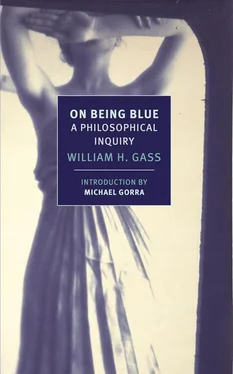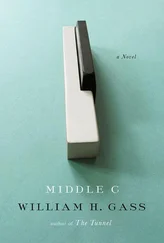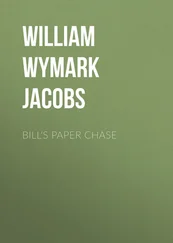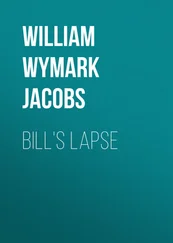As writers we don’t hesitate to interrupt murders, stand time on its tail, put back to front, and otherwise arrange events in our chosen aesthetic order, but how many instances of such coitus interruptus are there in the books which speak to us so frankly of the life we never frankly lead? how often does insertion come before erection, weak knees anticipate the kiss?
I should like to suggest that at least on the face of it a stroke by stroke story of a copulation is exactly as absurd as a chew by chew account of the consumption of a chicken’s wing.
• • •
The worship of the word must be pagan and polytheistic. It cannot endure one god. The Scots use blue brilliantly, for instance, and have their own term, blae, for gray blue, lead blue, and livid. The hedge-chanter is better known to them as the blue hafit, and if we pursue their names for the lumpsucker or sea owl, a fish of uncouth appearance, we come upon bluepaidle, or the even more common cockpaidle . The dictionary is as disturbing as the world, full of teasing parallels and misleading coincidence. The same fish is called a paddlecock on account of the tubercular skin which envelopes its dorsal ridge and which resembles the comb of that barnyard lord.
Suppose the name of any maiden’s private part were known to her alone. Suppose the name of Ellen’s pout were Rosalie. Then that name, if we came into possession of it, would argue an intimacy for us no parent or lover could overlook, as though we had been privy to the mole on her mount of Venus. From the first ‘In the beginning…’ words have been thought to have magical properties. They can, we are assured by authorities, persuade, snare, frighten, bless. They can stimulate, damn, anger, kill, caress. If signs are not the same as the things they designate, they are at least an essential segment, so that to speak the word, Rosalie, is to be halfway to Ellen’s occupation. Look how the blood rises in her bottle-skinny neck. What was naïve in the magician was the belief that things have names at all, but equally naïve are the learned and reasonable who reject any connection beyond the simply functional between blue and blue, Ellen’s beard and Rosalie. Words are properties of thoughts, and thoughts cannot be thought without them. We are truly in the blue, and if we try to think blue without thinking blue, we are forced into euphemism: Ellen’s pretty promenade, we say, Ellen’s merry whiskered friend, the South Pole Santa Claus, and so forth.
Which brings us to Fanny Hill , a dirty book without a dirty word; nor is the work as successfully suggestive as its title. There are plenty of explicitly sexual scenes, but ‘amorous engine’ is as blunt as Cleland can bring himself to be. He had a deep sense for the blush in blue language. As Christian Enzensberger has recently observed:
Its [language’s] reaction to smut is inevitably one of impotence if not downright hostility. It resists, begins to stammer, if dirty words have to be pronounced it does so, but sulkily, dutifully as it were, in the most unfeeling way, which is to say by means of onomatopoeia; in short, language becomes as embarrassed as the speaker himself and prefers to take refuge in indirect speech. ( Smut: an Anatomy of Dirt )
Lars Porsena or the Future of Swearing and Improper Language, a slight light blue book, was written in the twenties. There its author, Robert Graves, repeats Samuel Butler’s definition of Nice People as ‘people with dirty minds’ in order to point out that his book was written for Nice People like that, and partly to apologize for its discretions.
Observe with what delicacy I have avoided and still avoid writing the words x— and y—, and dance round a great many others of equally wide popular distribution. I have yielded to the society in which I move, which is an obscene society: that is, it acquiesces emotionally in the validity of the taboo, while intellectually objecting to it. I have let a learned counsel go through these pages with a blue pencil and strike through paragraph after paragraph of perfectly clean writing.
These scrupulosities are no longer necessary. I do not practice them. Yet I cannot honestly say I see any noteworthy improvement in our life, thought, or writing, now that ‘fuck’ can be heard and seen in public, because its appearance is as unmeant and hypocritical as its former absence was. We fear to seem a prude. We fear also the loss of revenues. So we green pencil in the penis, then yellow it out for prick. Cock is okay but only schoolboys have dicks. Thus civilization advances by humps and licks.
Of course every soldier-sport-and-buddy book believes that you can’t kill either animals or people without swearing at something first. Since one honors the animals one is about to murder, you must swear at your beaters. There are no girls in foxholes, as everyone knows, so there’s no occasion for sex (we should smile in our amorous wisdom at this remark); there is much manliness, however, which consists of saying ‘shit’ with every breath you haven’t used up spitting. Each rifle is erect. It would be hard to imagine a work in which there were all sorts of words for dogs, cats, and cows, their natures and parts (as in the expression, ‘by doggies’), without a single animal appearing in it (certainly not a dog, a cat, or a cow), but this is normal in the literature of strong (that is to say, embarrassed) speech. Strength of this kind, of course, is the visible side of weakness, and requires a special use for language which I should like to set aside for mention later.
The following verses from World War I, which Graves quotes, illustrate nicely the imaginative meanness of tough talk.
THE AUSTRALIAN POEM
A sunburnt bloody stockman stood,
And in a dismal, bloody mood
Apostrophized his bloody cuddy:
‘This bloody moke’s no bloody good,
He doesn’t earn his bloody food,
Bloody! Bloody! Bloody!’
He leapt upon his bloody horse
And galloped off, of bloody course .
The road was wet and bloody muddy:
It led him to the bloody creek;
The bloody horse was bloody weak,
‘Bloody! Bloody! Bloody!’
He said, ‘This bloody steed must swim,
The same for me as bloody him!’
The creek was deep and bloody floody .
So ere they reached the bloody bank
The bloody steed beneath him sank—
The stockman’s face a bloody study
Ejaculating Bloody! bloody! bloody!
There are a number of difficulties with dirty words, the first of which is that there aren’t nearly enough of them; the second is that the people who use them are normally numskulls and prudes; the third is that in general they’re not at all sexy, and the main reason for this is that no one loves them enough.
Contrary to those romantic myths which glorify the speech of mountain men and working people, Irish elves and Phoenician sailors, the words which in our language are worst off are the ones which the worst-off use. Poverty and isolation produce impoverished and isolated minds, small vocabularies, a real but fickle passion for slang, most of which is like the stuff which Woolworths sells for ashtrays, words swung at random, wildly, as though one were clubbing rats, or words misused in an honest but hopeless attempt to make do, like attacking tins with toothpicks; there is a dominance of cliché and verbal stereotype, an abundance of expletives and stammer words: you know, man, like wow! neat, fabulous, far-out, sensaysh. I am firmly of the opinion that people who can’t speak have nothing to say. It’s one more thing we do to the poor, the deprived: cut out their tongues… allow them a language as lousy as their lives.
Читать дальше












